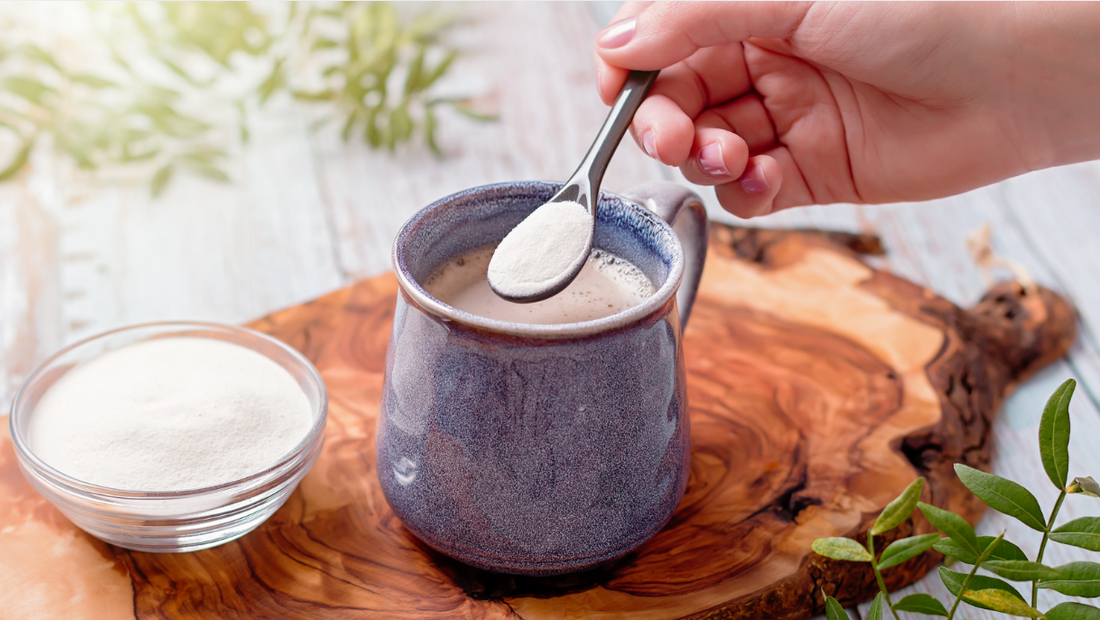Collagen might sound like the latest buzzword, but it’s not new… It’s actually something your body makes every day. It’s the main protein that keeps your skin firm, your joints moving smoothly, and your hair and nails strong.
But as we get older, our natural collagen production slows down, and that’s when we start to notice the little things like stiffer joints, fine lines, or nails that break more easily.
That’s where a good collagen supplement can help… And the best part is, you can sneak it into your day without thinking too much about it at all. Let’s talk about what it does, how to choose a good source, and the easiest ways to incorporate it into your daily routine.
🧬 What is Collagen?
Collagen is the most abundant protein in your body. It’s kind of like the glue that holds everything together. It’s found in your skin, hair, nails, bones, muscles, tendons, and ligaments. As we age, our natural collagen production starts to slow down (usually from our mid-20s onwards).
You can get some collagen through food sources like bone broth, meat, and fish, but it’s not always enough. That’s because your body also needs the right mix of nutrients, like vitamin C, zinc, and copper, to be able to synthesise and absorb collagen effectively.
That’s why collagen peptides (also called hydrolysed collagen) are such a great option. It’s already been broken down into smaller amino acids, making it much easier for your body to absorb and use where it’s needed most.
🌿 The Benefits of Collagen
While the research is still growing, studies show that taking collagen regularly may:
-
Support skin elasticity and hydration – helping reduce the appearance of wrinkles.
-
Strengthen hair and nails – no more brittle breakages!
-
Promote joint and bone health – by maintaining healthy cartilage and reducing inflammation.
-
Support muscle recovery and gut health – collagen contains amino acids that play a key role in tissue repair and digestive health. Collagen Peptides can also act as a prebiotic, which feeds the good bacteria in your gut.
☕ How to Use Collagen
One of the reasons collagen has become so popular is that it’s virtually tasteless and dissolves easily in liquids, which means you can sneak it into your day without even noticing. Here are a few ideas:
-
Morning coffee or matcha: Stir in a couple of teaspoons of collagen for a creamy, protein-boosted brew.
-
Smoothies: Blend it with your favourite fruits, greens, and nut milk.
-
Baking: Add it to pancakes, muffins, or bliss balls for an extra nutrient hit.
-
Soups or stews: Stir through at the end of cooking for a nourishing boost.
A little consistency goes a long way. Most people notice results after 6–8 weeks of daily use.
🥩 How to Choose a Good Collagen
Not all collagen is good collagen (and unfortunately, many brands are greenwashed). Here’s what to look for:
✅ Sustainably sourced: from grass-fed, pasture-raised cattle or wild-caught fish (marine collagen).
✅ Hydrolysed (or “peptides”): this means it’s broken down for better absorption.
✅ Free from artificial flavours and sweeteners: only made with real, natural ingredients.
✅ Backed by transparency: look for brands that share sourcing and testing info, like Chief Nutrition who have tested their collagen for heavy metals, pesticides and herbicides (like Glyphosate).
We’re big believers in knowing where your food comes from. Supporting brands that source their ingredients from local and regenerative farmers is best.
Our Top Collagen Picks
BioActive Collagen Peptides from Gutsy Ferments
Collagen Protein Powder from Chief
Collagen Protein Bars from Chief
All in All… It’s Pretty Good Stuff
Collagen is one of those small, daily rituals that can make a real difference over time, especially when combined with a balanced diet full of real, spray-free, nutrient-dense foods (our speciality 😉).
Whether you add it to your morning cuppa, blend it in your brekkie smoothie, or bake it into healthy treats, it’s a super simple way to support your body from the inside out.
💬 Disclaimer: Everyone’s body is different, so if you have any health concerns or medical conditions, it’s best to check in with your healthcare professional before starting a new supplement.
🔍 References:
Bolke, L., et al. (2019). A collagen supplement improves skin elasticity and hydration in women: a randomised, double-blind, placebo-controlled study. Nutrients, 11(10), 2494.
Clark, K. L., et al. (2008). 24-week study on the use of collagen hydrolysate as a dietary supplement in athletes with activity-related joint pain. Current Medical Research and Opinion, 24(5), 1485–1496.
Choi, S. Y., et al. (2014). Effects of collagen tripeptide supplement on skin properties: a prospective, randomised, controlled study. Journal of Cosmetic and Laser Therapy, 16(3), 132–137.
Healthline. (2024, January 29). What You Need to Know About the Health Benefits of Collagen. Healthline. Retrieved from https://www.healthline.com/nutrition/collagen-benefits#faq
Liu, Y., et al. (2022). Collagen peptides and their potential role in gut health: a review. Food Research International, 156, 111239.




